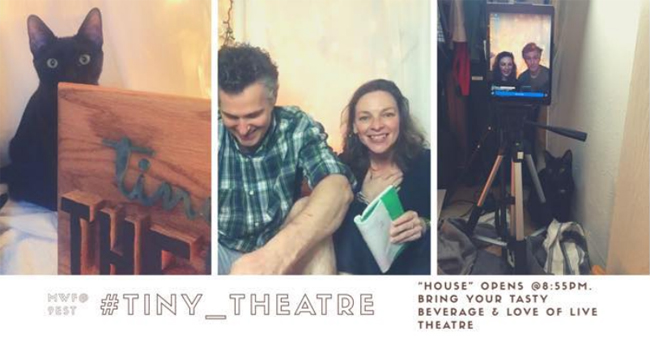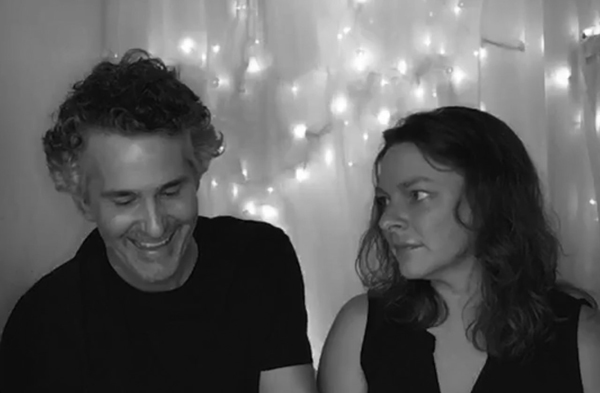Small Stage Philosophy
Kathleen Reichelt & Randee Silv
June 2020
I recently caught the reading of Kathleen Reichelt’s Darling, Genius (or How To Write A Novel In Thirty Days), a mumblecore inspired love story in two acts. Even with the actors closely nestled in their makeshift stage set, a closet, it was remarkably dynamic & thoroughly engaging. How can you not love the idea of a tiny theatre during lockdown? Rachel & Brendan have put together quite an amazing project. Tell us more.
In March 2020, as theatres and film productions closed down and quarantine began, Rachel Burttram Powers and Brandon Powers, two professional actors working in theatre, film and television, created a play reading series from their home, located on Sanibel Island, Florida. Using a tight camera frame in the small spaced closet, magically backdropped with a string of sparkling lights, the artists aptly named their online experiment Tiny Theatre, bringing the intimacy of live performance to audiences via facebook streaming. The set up is a mix of black box / white box theatre and live television broadcast. Ideal for a two hander, relationship focused play.
The setting does make for a very intimate reading. I liked that there were no props and/or other distractions. With Rachel & Brendan only inches away, the lives of the two characters they portrayed felt even more immediate, with the dynamics of their relationship so vivid that we were right there with them through all the ups & downs. How did all of this come together?
I was following an online theatre production on Facebook when the algorithm suggested Tiny Theatre. I liked the name, checked out the page and was immediately hooked. Rachel and Brendan are extremely talented and a joy to watch. And when I saw a call for women playwrights, I sent an early draft of my script Darling, Genius (or How To Write A Novel In Thirty Days). Rachel and Brendan read the full length drama over three nights. It turned out to be an ideal match for a script based in naturalistic dialogue, with an emphasis on dialogue over plot, as inspired by the subgenre of independent film mumblecore.
You refer to your play as a “mumblecore inspired love story.” What led you in that direction?
Mumblecore is a term accredited to filmmakers who created no budget features in the early to mid 2000s. Not a movement as much as a surge of creations that came from accessibility to inexpensive cameras. But it does have philosophical characteristics, preceded by a wave of narratives that strayed from mainstream rom-com, and offered GenXers a mirror for their whatamIgoingtodowithmylife pondering, and a no false happiness stand. Influenced by films such as Before Sunrise, Reality Bites, Slacker, Manhattan and Annie Hall, mumblecore is based in realism that dips into existential contemplation, or, sometimes into meaningless hipsterdom. But the best of them are schooled in the films of Ingmar Bergman or writers such as André Malraux. I enjoy this style of film writing and wanted to take the approach to the stage.
Yes, there was definitely plenty of pondering, mirroring & contemplation. There were moments when I couldn’t tell if it was Rachel & Brendan’s own story, or that of the play’s characters, or even at times, mine. Feelings & emotions just seemed to naturally fly & crisscross. The awkwardness, the complications of love, were crystal clear. What’s the thread that connects with writing a novel in 30 days?
The idea that a novel of worth could be written in thirty days is a nod to absurdity, a punch at formula, a criticism of easy endings and predictability. Throughout the story the characters discuss music, writing, making films, emphasizing the relationship to art making and each other. The desire and practicalities of creating art. Selecting a musical instrument based on size. Picking a job to pay the bills. Class differences, middle class expectations, societal demands push at these characters who soon realize they aren’t sharing the same bubble. Idealism crashes into choice. Work becomes the focus of aging into adults.
Unfortunately the idea that art is for youth and adults need “real jobs” is a pervasive concept in Western society. That we are stuck in a cycle. An image of Camus’ Sisyphus pushing the rock up the hill only to repeat comes to mind. Repetition of work, repetition of relationships, experiences, patterns, people, Monday to Friday, holidays, events that provide a familiarity lacking in spontaneity, a kind of nausea found in the Existentialist movement, which, as noted in the Stanford Encyclopedia of Philosophy “was as much a literary phenomenon as a philosophical one.”
Your characters do delve into territories that could seem uncomfortable, but as we witness these transitions, they seem so natural. What do you see as the link between your play & the Tiny Theatre?
Rachel and Brendan were in the final dress rehearsal for Florida Rep’s production of A Doll’s House, Part 2, when the theatre closed. The story goes that Rachel was at home clearing out a closet when she had the idea to use the space for script readings, and created Tiny Theatre. Darling, Genius (or How To Write A Novel In Thirty Days) is grounded in small stage, fringe philosophy, as is the DIY of Tiny Theatre. Both value independent work, art, creation, and the unique perspectives that come with scale. Bigger isn’t always better.
The full reading can be viewed in three sessions by clicking on the links below. Readings start approximately 8 – 10 minutes in.
PART ONE→
PART TWO →
PART THREE →
“Our Tiny Theatre is in NO WAY meant as a replacement to a LIVE THEATRICAL EXPERIENCE. We are career professional actors and take the artform very seriously. Us reading plays out of our closet is hardly the equivalent of a fully realized, fully rehearsed professional production. This is a tool for us, playwrights, writers and theatre lovers to satisfy our need and want of artistic endeavors and a sense of community during the COVID19 pandemic. Support theatre however you can! Keep the ARTS alive!”
For more information about Rachel Burttram →
And more about Brendan Powers →


